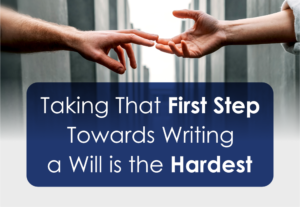The biggest stumbling block to writing a will is taking that first step to face the fact that we all die someday. It is not easy for people, especially those who are younger, to wrap their heads around that idea. This causes them to procrastinate about doing up a will, or put it off completely.
However, if people can get past this mental hurdle, the subsequent path is well-trodden and easy to negotiate. There has to be a recognition that a will, essentially, provides instructions on how your assets are to be distributed according to your wishes after you are dead. It doesn’t mean that you are going to die tomorrow. And importantly, you are not writing a will for yourself, but for your loved ones.
In theory, anyone can write his or her will on a piece of paper. As long as it is signed and witnessed by two independent adult witnesses, it should be legally binding. This would ostensibly be the easiest path for an individual to pursue if, for example, you are married with no children and want to leave everything to your spouse. It is the simplest type of will.
But before you rush off to find that piece of paper and pen to get started on writing that will, there are some serious questions that need to be considered which can apply to anyone.
For example, what happens if you own property overseas, or have foreign investments and bank accounts? Are the laws relating to inheritance the same in those countries compared to your own country? What are the tax ramifications? Another common question that arises is if you have people who are financially dependent on you other than your immediate family? How do you ensure that they are taken care of after you are gone?
Such questions or scenarios make writing a will more complex than it would appear at first. It is thus advisable to seek professional guidance to ensure that everything is above board and your instructions are crystal-clear in the event of death. Even a seemingly straightforward issue such as wording a will to make it unambiguous requires someone with experience to tell you what works and what doesn’t. Remember that a badly worded can be challenged in court.
We reiterate that it is best retain the services of professional such as an estate planner and lawyer to help you. Their experience will help you identify potential problem areas and find solutions for them. There are typically three basic steps to writing a will:
1) Name your beneficiaries – Who gets what
2) Name your executor – The person who makes sure your assets are distributed according to your wishes
3) Get your will witnessed – Your witnesses have to be adults and not named as beneficiaries
-
Name your beneficiaries – Who gets what
-
Name your executor – The person who makes sure your assets are distributed according to your wishes
-
Get your will witnessed – Your witnesses have to be adults and not be named as beneficiaries
Parents who have minor children who are still minors may need to take the additional step of naming a guardian for them in the event of their death. If you are married, the guardian will probably be your spouse. If you are divorced, it will probably be your ex-spouse. If you do not have a spouse or your ex-spouse is not an option, then you have got some thinking to do.
Note: In our next article, we look at some of the common mistakes that are made when writing a will.










